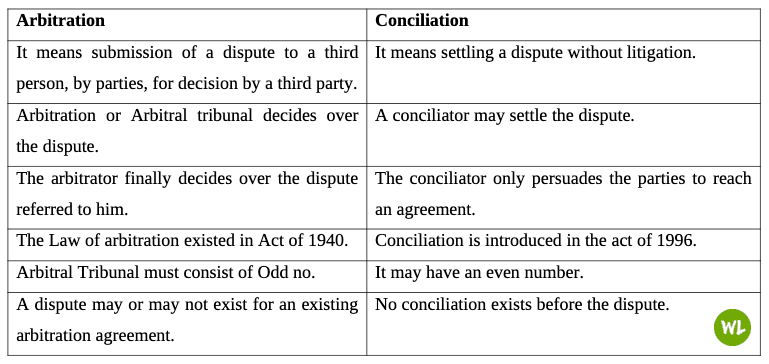
Meaning of Conciliation
Conciliation is the procedure through which the conciliator informally tries to settle the dispute between the parties and brings them to an agreement. The success of these proceedings depends upon the ability of the conciliator. The conciliator does the following:
- Lowers tensions.
- Improves communications.
- Interprets the issues.
- Provides technical issues.
- Explores potential solutions.
In this Arbitration and Conciliation Act, 1996 law note above, we saw the conciliation meaning. Next, we will touch on several important points related to conciliation. Let us start with the appointment of a conciliator and work our way up.
Appointment of Conciliator (Section 64)
As per section 64 of the Arbitration and Conciliation Act, 1996, here are the rules for the appointment of a conciliator:-
1. There can be any number of conciliators. Be it one, two or three, depending upon the wish of the parties.
2. In the case of one conciliator, the parties may agree on the name of a sole conciliator.
3. In the case of two conciliators, each party may appoint one conciliator.
4. In the case of three conciliators, each party may appoint one conciliator, and parties may agree on a third conciliator to act as a presiding conciliator.
Procedure of Conciliation
Commencement of the Conciliation Proceedings (Section 62)
The conciliation proceedings are initiated when a party invites the other party for conciliation by notice in writing. Conciliation proceedings start only when the other party accepts the invitation, and there will be no proceeding if the party rejects the invitation.
Submission of Statement to Conciliator (Section 65)
The conciliator asks both parties to submit a written statement describing the nature and point of dispute. Both the parties shall send a copy of the written statement to each other. Parties are also asked to submit their facts of the case and the grounds on which they have filled the case, along with the supporting documents.
Conduct of Conciliation Proceedings (Section 69(1), 67(3))
The conciliator may invite both the parties to meet them either together or separately. He has the freedom to conduct the proceeding in the manner as he may find appropriate.
Administrative Assistance (Section 68)
According to section 68 of the Arbitration and Conciliation Act, 1996, parties may also get administrative assistance for conducting the proceedings.
Role of Conciliator
The primary roles or principles of a conciliator are:
1. Assist parties in reaching an agreeable settlement of their issue in an independent and impartial manner.
2. Be guided by principles of objectivity, fairness, and justice.
3. The conciliator is free to conduct the conciliation proceedings in any way he finds fit, taking into account the facts of the case and the expressed wishes of the parties.
4. At any point during the conciliation process, the conciliator may make ideas for resolving the disagreement.
5. Such proposals need not be in writing and need not be accompanied by a settlement of the reasons thereof.
6. Disclose information received by one party to the other, except in special conditions.
7. Unless otherwise agreed by the parties-
- The conciliator shall not act as an arbitrator or representative in the same case.
- The parties are not permitted to call the conciliator as a witness.
Must Read: Arbitration Council of India – Composition, Functions, and More
Settlement of Disputes (Section 73)
According to section 73 of the Arbitration and Conciliation Act, 1996, settlement of disputes takes place through certain steps mentioned below:-
1. Formulate the terms of a possible settlement.
2. The conciliator may reformulate the conditions of a prospective settlement after receiving the parties’ observations.
3. When the parties reach an agreement on a settlement, they may draw up and sign a written statement.
4. The settlement agreement shall be final and binding on the parties.
5. The conciliator shall authenticate the settlement agreement. The settlement agreement shall have the same effect as of arbitral award. (Section 74)
6. Confidentiality shall be maintained by the conciliator and parties whenever necessary. (Section 75)
Termination of Conciliation Proceedings (Section 76)
According to section 76 of the Arbitration and Conciliation Act, 1996, the conciliation proceedings shall be terminated in the following ways-
1. By signing the settlement agreement by the parties on the date of the agreement; or
2. After the written declaration of the conciliator on consultation with the parties on the date of the declaration of result, the result becomes final, and further efforts at conciliation are no longer justifiable.
3. By a party’s written declaration to another party.
Difference Between Arbitration and Conciliation
| Arbitration means submission of a dispute to a third person for the decision making by the disputed parties.
| Conciliation means settling a dispute without litigation.
| Arbitration or Arbitral tribunal decides over the dispute.
| A conciliator may settle the dispute.
| The arbitrator finally decides over the dispute referred to him.
| The conciliator only persuades the parties to reach an agreement.
| The law of arbitration existed in the Act of 1940.
| Conciliation is introduced in the Act of 1996.
| The arbitral tribunal must consist of an odd number of arbitrators.
| Conciliation tribunal may have an even number.
| A dispute may or may not exist for an existing arbitration agreement.
| No conciliation exists before the dispute.

Read Next:
1. Arbitration In Sports in India – Court of Arbitration for Sports (CAS)
2. 10 Types of Disputes That Can Be Settled by ADR
- 13 Characteristics of a Company Under the Companies Act - 5th March 2024
- Lee vs Lee’s Air Farming Ltd – Case Explained - 5th March 2024
- Relevant Facts Under the Indian Evidence Act - 14th January 2024







